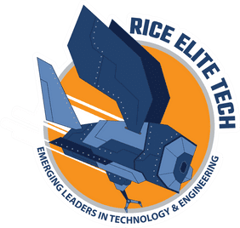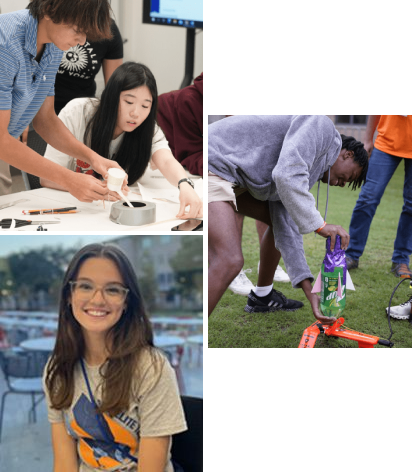
Engineer your future and build your college-level engineering & technology skills at Rice ELITE Tech Camp.
Hosted on the campus of Rice University, Houston, Texas
Summer 2025 Sessions:
June 22-28 | July 6-12 | July 13-19 | July 20-26
Rice ELITE Tech Camp is a week-long program of intensive STEM activities and engineering design challenges for high school students.
Developed by Rice University’s Center for Engineering Leadership, the Rice ELITE Tech Camp provides college-level instruction in engineering & technology fundamentals, equipping students with the tools they need to prepare for their next educational and career steps.
Sessions include a hands-on curriculum that allows students to employ technical, scientific, and analytical concepts to solve real-world problems.
Summer 2025 sessions for residential and commuter students will be held at Rice University in Houston!

Benefits of Attending Rice ELITE Tech Camp
Uncover Your Potential: Rice ELITE Tech Camp provides college-level instruction in engineering & technology fundamentals, equipping high school students with the tools they need to prepare for their next educational and career steps.
Make Connections: Build a valuable network with Rice University’s world-renowned instructors and high-achieving peers.
Reach Your Goals: Empowers students to develop critical skills such as problem-solving, creative thinking, and confidence to serve them on the path to college and career success.
Work on Real Tech Challenges: AI, Coding, Robotics, Bioengineering, Space Flight Engineering, 3D Modeling, and more!
Rice ELITE Tech by the numbers
100%
100% of parents said their students’ experience met or exceeded their expectations
97%
97% of students agreed that their instructor(s) had a strong knowledge of the curriculum & activities
97%
97% of students said their course(s) gave them a deeper knowledge base of the program content
Results from a recent Rice ELITE Tech Camp student and parent participant survey
Summer 2025 Course List

 NEW!
NEW!
Bioengineering for Future Leaders
This course will introduce you to the fundamental principles of bioengineering and its applications in solving real-world problems. You will explore how biology, engineering, and technology converge to address challenges in healthcare, environmental sustainability, and biotechnology, and how engineering and medicine mix to be the driver of medical advancements.

Deep Learning: Deploying AI to Maintain Smart Cities
In this course, you’ll use Python to design and implement a neural network algorithm capable of classifying structure images as damaged and determine the level of damage. Work like this is essential to civil engineers in charge of designing, constructing, and maintaining highways, bridges, and other important infrastructure.

Learning Python to Solve Engineering Problems
In this course, you’ll learn to solve thermal energy problems like a mechanical engineer as you develop your own Python code to model temperature changes when food is cooked and predict when it reaches a temperature that is safe for consumption. This work is conducted every day by companies such as Proctor & Gamble, NASA, and Tesla.

3D Modeling & 3D Printing
In this course, you’ll learn how to design a 3D environment and how to prepare files for DFaM (design for additive manufacturing). You’ll design and build your own, unique 3D model and watch it come to life in the 3D printer.

Internet of Things, Machine Learning, & Python
In this course, you’ll study different Applied Machine Learning concepts, code examples in Python and MySQL, and deploy your code for testing. You’ll walk away from this course understanding how technology is applied in multiple different industries.

Robotic engineering I: Adding Robot Muscles to Your Inventive Ideas
In this course, you’ll focus on design and use of electric motors in automation (including robots). The course will explore motor types and how to select the right type for the application.

Robotic Engineering II: Adding Sensors for your Robot to See, Hear Feel, and Smell
Future engineers who want to work with robots often think of humanoid robots. In this course, you will learn how to allow your robot to see, hear, feel and even smell. (Students do not need to take Robotics I in order to take Robotics II.)

Learning C++ for Human Spaceflight Engineering
In this course, you’ll study the concepts of fluid mechanics that allow scientists to design smaller, faster, and more economical rockets. Then, you’ll work on your programming skills in C++ to put these concepts to life as you test rocket design parameters and the effect of spaceflight on the human body.
Summer 2025 Tuition
- Residential Program
- $3,795
- Commuter Program
- $1,695
Payment plans are available. For more information, call 844-794-4427.





